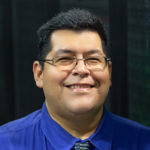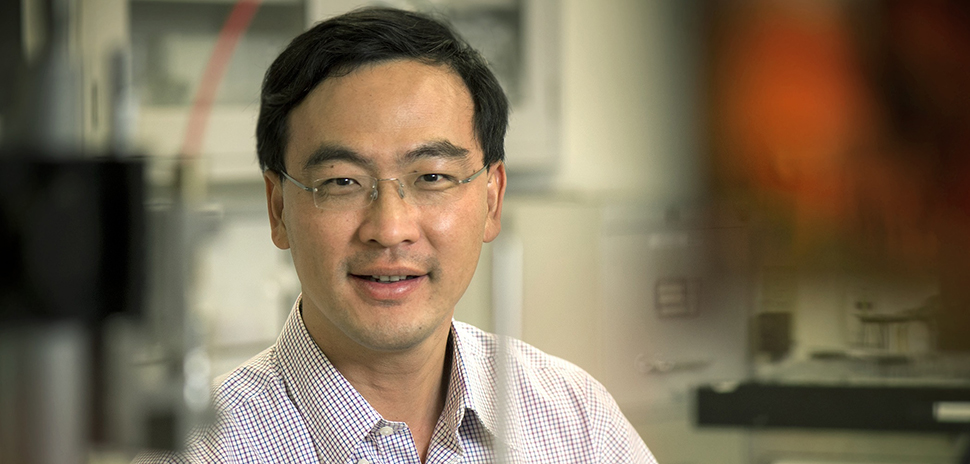![]() Every week, we do a little research of our own. We’re looking for scientists, professors, engineers, entrepreneurs—anybody, really—engaging in research and development across North Texas.
Every week, we do a little research of our own. We’re looking for scientists, professors, engineers, entrepreneurs—anybody, really—engaging in research and development across North Texas.
There’s plenty of good work being done. If you want to put R&D under your microscope, sign up for our e-newsletter.
UTD researcher hopes his work puts chess computing platform in check
What’s your next move? For a UT Dallas computer expert and researcher, it’s developing a new chess supercomputing platform he believes will give a major advantage to the university’s award-winning chess team, and, perhaps, chess players worldwide. After all, every move counts in chess, and it’s all about protecting the king.

Jerry Perez [Photo Courtesy UT Dallas]
Developing the new computing solution is the work of Jerry Perez of Cyber Infrastructure Operations in the Office of Information Technology, and he’s been working on it for several years.
“The problem with chess is that there are more possible moves in a game than there are atoms in the universe, and humans only know a patch of good moves. The best chess players memorize this little area,” Perez said in a news release. “But with computers, we are able to go beyond this limited cloud of knowledge and find other paths. Computers have helped navigate us through.”
The university points out that computers can’t be used during matches, but outside the tournament setting, they can be used to analyze tendencies or potential opponents and prepare players for their next match.

Weidon Zhou of the University of Texas at Arlington. [Photo Courtesy UT Arlington]
UTA prof works on reabsorbable electronic brain implants
First you see it, then you don’t. That’s sort of the theory behind an an implantable optical probe that can be inserted in the brain to monitor brain function after traumatic injuries or surgeries and that will then be absorbed by the body.
It’s being developed with the help of a $200,000 Partnerships for Innovation grant from the National Science Foundation by Weidong Zhou, a Distinguished University Professor in electrical engineering at UTA, derived from his work with John Rogers, a world leader in the field of bioreabsorbable or biodegradable electronics at Northwestern University.
Such a device would increase patient comfort during recovery, the university said in a release, and reduce the risk of complications from surgical removal of such monitoring devices. For a deeper dive, head here.

[Illustration: sarunyu_foto via iStock]
3 teams formed to find solutions to age-related cognitive decline
The Dallas-based American Heart Association and Seattle-based Paul G. Allen Frontiers Group announced Friday that three new large-scale, multidisciplinary research teams have been assembled to answer such questions as:
- Could our blood hold the molecular secrets to a fountain of youth, preventing age-related brain disorder?
- Are brain aging and Alzheimer’s disease caused by a failure of interconnected systems in our bodies, triggering a domino-like cascade of disease?
- And, can targeting the red blood cells and blood vessels jointly keep our brains healthy and prevent dementia?
The teams are awardees of the American Heart Association-Allen Initiative in Brain Health and Cognitive Impairment, a collaborative funding initiative that was launched earlier this year, according to a release.
According to the release, the three teams—headquartered at the Salk Institute for Biological Studies in La Jolla, California; Stanford University School of Medicine in Stanford, California; and University Hospitals Cleveland Medical Center in Cleveland, Ohio—will work to develop solutions to the problem of age-related cognitive decline.
It’s a problem that is becoming increasingly urgent as people continue to live longer lives in some parts of the world. Age-related dementia is becoming more prevalent and is projected to reach more than 75 million people worldwide by 2030.
The American Heart Association and the Frontiers Group, along with other contributors including the Oskar Fischer Project and the Henrietta B. and Frederick H. Bugher Foundation, have committed $43 million to make significant progress in the understanding of and treatments for age-related cognitive disorders, according to the release.
EPA registers Plano company’s bacteriostatic surface coating
Plano-based biotechnology company Allied Bioscience has received an approved label from the U.S. Environmental Protection Agency for its SurfaceWise bacteriostatic surface coating.
 The product inhibits the growth of, and offers continuous protection against, bacteria, fungi (mold and mildew), and algae that cause odor, staining, and discoloration in a variety of commercial settings, including sports facilities and hospitals, the company said in a news release.
The product inhibits the growth of, and offers continuous protection against, bacteria, fungi (mold and mildew), and algae that cause odor, staining, and discoloration in a variety of commercial settings, including sports facilities and hospitals, the company said in a news release.
“This is an exciting, much-anticipated milestone for our company that wouldn’t be possible without the ongoing collaboration we’ve been pleased to experience with the EPA,” Allied BioScience CEO Mike Ruley said in the release.
The company said the EPA’s decision to register SurfaceWise was made after the agency did a scientific review of its effectiveness, toxicity, and safety data.
READ NEXT
![]()






































































